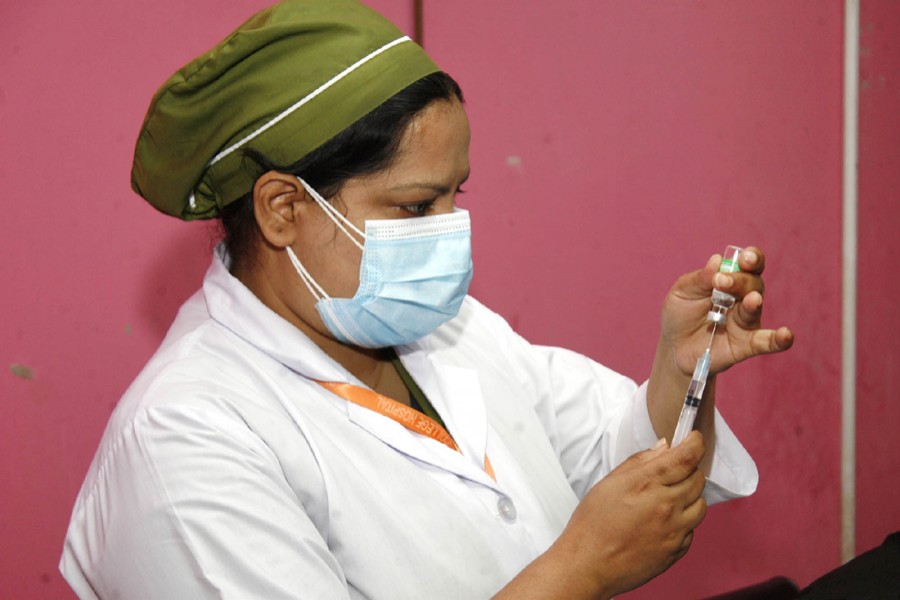People with comorbidity under 55 years are not on the priority list of mass vaccination for lack of a national registry of non-communicable diseases (NCDs) like diabetes, hypertension and COPD.
The directorate general of health services (DGHS) is expected to complete vaccination of 6.0-million people by February 2021.
Officially, DG health and health ministry always advise people with comorbidity to take cautious measures if they are infected with coronavirus and get hospital admission for high vulnerability.
Unofficially, they are considering people aged 55 or above and the front-liners for urgent vaccination, numbering 15 million in the first phase.
This was disclosed during a question-answer session on issues regarding vaccination, app and registration complications after a roundtable discussion on communicable diseases at a city hotel on Saturday.
On registration hiccup, DGHS director general Prof Dr ABM Khurshid Alam said everyone under 55 years will get the vaccine. But the app is not open to all now.
It will be opened in phases. But there is no relation of comorbidity with their priority list, he added.
DGHS additional director general Prof Meerjady Sabrina Flora said the DGHS expects to complete vaccination of 6.0-million people next month.
These 6.0-million people will be selected on a priority basis. Front-liners who are above 18 years can register on the web portal, she cited.
Among the general public, people above 55 years will be able to register. The DGHS has taken one week's time to observe the web portal and vaccination management.
Dr Flora said the website is active, but the mobile app has not been approved by Google yet. Once the app is approved, it will be available on handsets.
On journalists' criteria, Dr Alam said there is no database of journalists. The media people or journalists whose names will be sent through the proper authorities will get the vaccine.
This time, he advised all to get registered to make the vaccination programme successful.
Bangladesh is a high-burden country with ever-increasing NCD prevalence due to economic development and a changed lifestyle.
NCD accounts for an estimated 59 per cent of the total deaths in the country. Approximately 0.9-million people die every year due to various NCDs.
According to NCD division of DGHS, the prevalence rate of hypertension is 25 per cent, diabetes 9.0 per cent, asthma 7.0 per cent. Here pre-diabetes and pregnancy with diabetes were not counted.
Dr Alam said there will be 59 vaccination centres across the country with 43 in Dhaka. As many as 6,990 teams will be deployed countrywide.
The number of teams will be 354 in Dhaka.
Health minister Zahid Maleque will select a hospital where he will take the vaccine to inaugurate the nationwide mass vaccination on February 07.
All the DGHS staff members will also take vaccine the same day, he added.
Earlier in the day, a roundtable was held marking World Neglected Tropical Disease (NTD) Day that falls on January 30. This year's theme is 'Ending NTDs: Together Towards 2030'.
But health ministry will officially observe the day on February 02.
The disease control division of the DGHS with support from the World Health Organisation and UKAid organised the programme.
There are 20 listed NTDs globally. But there are programmes for seven NTDs in Bangladesh-leprosy, dengue/chikungunya, lymphatic filariasis, soil-transmitted helminthiasis, kala-azar, snakebite and rabies.
LD TB-Leprosy and ASP director Prof Dr Shamiul Islam said Bangladesh has been working to achieve all the global targets of eliminating communicable diseases. Two programmes have already achieved targets.
But in case of infectious or communicable diseases, he said, the issue of emerging and re-emerging should be considered because the success may be tarnished if there is reluctance.
ASCEND Bangladesh country lead Prof Dr Be-Nazir Ahmed said Bangladesh has significant success in five out of seven NTD programmes. But success has increased negligence which is not acceptable.
He, however, said snakebite and dengue are still two of the most challenging diseases in the country. There is a possibility of the vaccine of dengue.
But snakebite patients do not come under the health system as they go to indigenous local physicians and snake charmers, he observed.
Dr Ahmed said doctors are also shy of treating snakebite patients with antivenom due to stigma.


